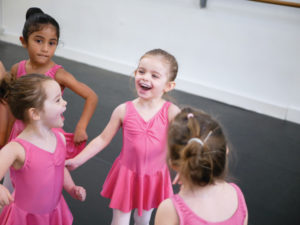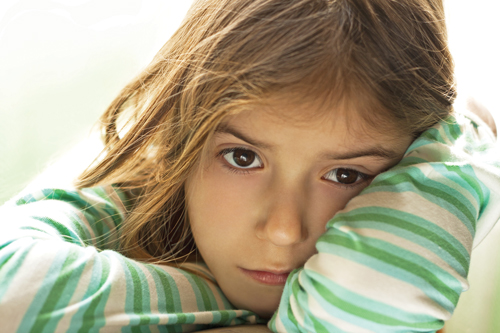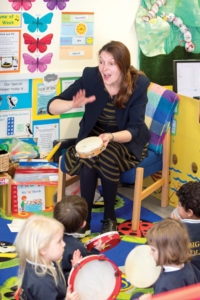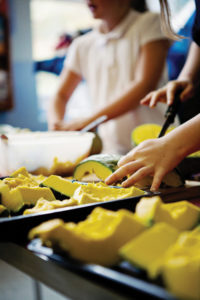Anne-Marie Coe has been a teacher for over 20 years at Our Lady of Sion School in Worthing and is a mother with grown up children. Now in the role of Assistant Head, Pastoral, she has been instrumental in developing the Wellbeing Programme at Sion which has recently been recognised with an ISA (Independent Schools Association) award for Excellence and Innovation in Mental Health and Wellbeing. This programme successfully supports pupils and helps raise awareness about issues surrounding mental health with a whole school approach. Taking the stigma out of mental health is at the core of the programme so that students feel comfortable and confident in understanding and talking about their feelings.
Our mental health and emotional wellbeing is all about how we think, feel, and behave. It can affect daily life, relationships, and even physical health. It is our ability to enjoy life – to attain a balance between life activities and efforts to achieve psychological resilience.
The emotional wellbeing ofour children is just as important as t heir physical health. Good mental health allows children and young people to develop the resilience to cope with whatever life throws at them and grow into well-rounded, healthy adults.
Most children grow up mentally healthy, but surveys suggest that more children and young people have problems with their mental health today than 30 years ago. This can be attributed to changes in the way we live now and how that affects the experience of growing up.
The sad reality is that mental health problems affect about one in 10 children and young people. They include depression, anxiety and conduct disorder, and are often a direct response to what is happening in their lives. Sadder still is that 70% of children and young people who experience a mental health problem have not had appropriate interventions at a sufficiently early age (as cited by The Mental Health Foundation).
In our roles as parent, carer or teacher we are very keen to fix things, so what can we do to keep the children and young people in our care mentally well?
Technological advances mean there is the biggest gap in cultural understanding between adults (parents and teachers) and children since the 1960s. The challenge is to bridge the divide because communication is key to good mental health. In order to have an open and honest dialogue with our children, we need to understand their world and what is important to them.
Empathy versus sympathy
The ability to understand and share the feelings of children and young people is a way in to meaningful conversations about their lives and what may be troubling them. With younger children, empathic listening will help their previously unmanageable feelings become more manageable. Take, for example, the toddler who doesn’t want to leave the play park and starts screaming – by saying that you understand that they love that play park and that they don’t want to go home, they will experience the relief of being understood and no longer being alone with their feelings of loss.
Play is a great way for children to express themselves as well as through words. You can learn a lot about how they’re feeling by simply spending time with them and watching them play. Stressed and upset children often play fighting games with their toys. Commenting that there are a lot of fights going on, or that it seems pretty frightening, can pave the way for them to open up to you about what is bothering them.
Dealing with change can be as difficult for us as it is for the children and young people. Changes such as moving home or school can often act as triggers for anxiety. Some children who start school feel excited about making new friends and doing new activities, but others may feel anxious about entering a new environment. One of the most important ways parents, carers and teachers can help is to listen to them and take their feelings seriously.
Starting school, or a new school, can lead to separation anxiety in some children – excessive and persistent worrying at being separated from those the child is attached to or worry that harm will come to them. Following the ABC plan is a great way to prevent the anxiety from becoming overwhelming or unmanageable.
Step A – acknowledge and validate how they are feeling with empathic listening.
Reassure them that anxiety is normal and that the aim is not to have zero anxiety but to prevent it becoming overpowering.
Step B – build self-esteem.
What I am good at and my achievements; what I like about myself; nice things that people say about me; my happiest memories, people I am grateful for.
Step C – challenge and plan.
Where is the evidence? How likely is it to come true? What if it does come true? What is a suitable alternative thought? Choose a goal and break it down into small steps.
It is also a difficult time when your child is grieving as you may also be in a state of grief and coping with overwhelming emotional pain that this brings. If they seem tearful or withdrawn, encourage them to open up about how they’re feeling by talking about the person who’s died.
Young children have an awareness of death, but can see it as reversible. It helps to explain it by saying, “… has died … is not going to be with us any more”. They may also blame themselves and can become angry or have difficulty with changes in routine. They may even have psychosomatic symptoms. Older children (around eight years old) start to understand the finality of death so their anger and distress levels can be higher. They can also display younger behaviour or may try to be the perfect child and be brave. Their grief will make them feel different from their peers and it is important that they feel supported by their school community.
We need to remember that children and young people’s negative feelings usually pass. However, it’s important to get professional help if your child is distressed for a long time, if their negative feelings are stopping them from getting on with their lives, if their distress is disrupting family life or if they are repeatedly behaving in ways you would not expect at their age.
If your child is having problems at school, a teacher, school nurse, school counsellor or educational psychologist may be able to help. Otherwise, go to your GP or speak to a health visitor. These professionals are able to refer a child to further help. Different professionals often work together in Child and Adolescent Mental Health Services (CAMHS).
To end on a happy note here are the top tips for keeping our mental health and that of our children in top shape.
Smile – pass on a smile to someone.
Optimism – self-fulfilling prophecy – thoughts and behaviours will follow.
Creativity – everyone needs a creative outlet, something which lets us exorcise difficult feelings, perhaps through sport, art, music or drama.
Kindness – a random act of kindness each day.
Mindfulness – meditation – focus on your breathing – think of nothing!
Gratitude – think of three things that you are grateful for each day.
Have fun! – make time to do things that you enjoy. Happiness is contagious!
Our Lady of Sion is an independent interdenominational school based in Worthing for girls and boys, ages 3 to 18. www.sionschool.org.uk


 Ballet offers so much more than just pointed toes; it offers children the opportunity to express themselves freely, whether that be using their butterfly wings to fly away, or joining the marching band and playing their favourite instrument. This is something very few other physical activity schemes offer. This creativity is so important to a child as it enables them to explore their inner selves in addition to the physical world, creating emotional experiences and memories that will remain with them for life. I would highly advise all children are given the opportunity to dance, whether this be something they wish to pursue as a career, perform as a hobby or just use as a regular class for fitness purposes. The positive effects on their social, cognitive and physical development are numerous.
Ballet offers so much more than just pointed toes; it offers children the opportunity to express themselves freely, whether that be using their butterfly wings to fly away, or joining the marching band and playing their favourite instrument. This is something very few other physical activity schemes offer. This creativity is so important to a child as it enables them to explore their inner selves in addition to the physical world, creating emotional experiences and memories that will remain with them for life. I would highly advise all children are given the opportunity to dance, whether this be something they wish to pursue as a career, perform as a hobby or just use as a regular class for fitness purposes. The positive effects on their social, cognitive and physical development are numerous.

 Music helps us learn
Music helps us learn
 Or use festivals as your excuse for experimentation. Make a simple curry with your children for Diwali or a chili for the Day of the Dead.
Or use festivals as your excuse for experimentation. Make a simple curry with your children for Diwali or a chili for the Day of the Dead.









